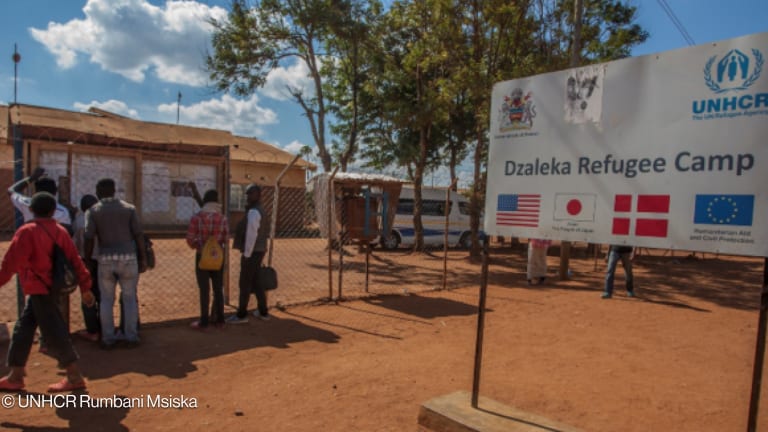
MALAKAL, South Sudan — Six years ago, before South Sudan erupted into civil war, Lok Ruei was healthy. But two years after moving into the U.N. protected site in Malakal town, the 37-year-old father of six contracted tuberculosis.
“There’s so many people living in one area, there’s no space, getting air is hard,” Ruei told Devex. Seated on a chair steeped in mud in Malakal’s U.N. site, Ruei said six years of living in the camp has taken a physical and emotional toll.
“It’s important that aid and development organizations adapt to support people in developing skills and services that can flourish in more urban environments.”
— Garth Smith, country director, Danish Refugee Council“Life in the [camps] is like living in a jail,” he said.
Despite a power-sharing agreement signed more than one year ago to end South Sudan’s civil war, more than 194,000 people still live in squalor in six U.N. protected sites across the country. Filthy, muddy, and overcrowded, the camps were never intended to be permanent when the U.N. unprecedentedly flung open its doors in 2013 to protect tens of thousands of people from fighting.
Many camp residents who haven’t left in years, like Ruei, are concerned about how they’ll cope once they do. The country’s health care system is sorely underfunded, receiving less than 2% of the national budget, according to the 2019 draft budget seen by Devex. The conflict destroyed at least 20% of the country’s 1,900 medical facilities, leaving more than half of the population without access to services, according to the ministry of health.
When Ruei got sick, he sought treatment at the Médecins Sans Frontières clinic in the U.N. camp in Malakal, one of the few hospitals treating tuberculosis in Upper Nile state. While he has recovered from the disease, he has friends in the camp who still need treatment and is worried about how they’ll continue care once they leave.
“Access to medical care outside concerns me,” he said.
As South Sudan slowly emerges from five years of fighting, which killed almost 400,000 people and displaced millions, aid groups are scrambling to figure out how to provide continued medical assistance and basic services for people who want to go home — specifically those who have been living in U.N. protected sites.
A tricky situation
“Whilst populations in the [camps] have health care on their doorstep, health care services, including supplies of regular medicines, may not be as easily accessible outside,” said Natalie Page, health adviser with international aid group Medair.
Many health facilities are struggling to provide quality services and any influx of people will stretch what little is available, she said.
In Malakal town, approximately 30,000 people still shelter in the U.N. protected site. The relative safety within the camp comes with the risk of exposure to life-threatening diseases and undignified living conditions, according to a June 2019 report by MSF.
Conditions in the camps are dire, and people continue to get sick. MSF has repeatedly called for services to be improved, particularly water and sanitation. Latrine overflow forms a “stagnant sludge,” for example, often enticing children to play with it, which can result in diarrhea, skin and eye infections, and worms, according to the report. Airborne diseases such as tuberculosis are particularly widespread, and MSF staff members told Devex they are seeing 20 to 30 new tuberculosis cases per month, a slight increase from previous years.
TB treatment takes a minimum of six months. But few, if any, clinics in the rest of the region have the necessary medicine. If patients want to leave the clinic before treatment is finished, it will be hard for them to continue care.
It’s “tricky,” said Sébastien Loth, field coordinator for MSF in Malakal. “I don’t think we’ve found a solution to make sure that those patients will be able to continue when they go back to where they are [from],” he said. When patients from the hospital are ready to leave the camp, lack of access can hinder them from attending follow-up appointments, meaning they can’t continue treatment and get drug refills, Loth said.
MSF is working with the state ministry of health and other humanitarians to build the government’s capacity to provide health services. It also conducts outreach activities in places that don’t have easy access to health care.
Humanitarian hubs
While aid groups have significantly scaled up services outside of the camps this year — reaching 3.4 million people in remote areas — coverage of basic services remains limited. More than 4 million people have insufficient access to health services and more than 7 million people are reliant on aid.
Additionally, since July, almost 1 million people in 32 counties have been affected by heavy flooding. Entire communities are submerged, and health facilities and nutrition centers are filled with water or being used to shelter people who have fled the flooding, according to the U.N.
These difficulties, along with the protracted humanitarian crisis, have pushed organizations to rethink their approach to assistance.
Public aid documents seen by Devex show a proposal for the establishment of several decentralized humanitarian hubs to be situated in hard-to-reach areas around the country. The idea is to give aid workers a base to deploy to remote areas such as Leer in Unity state and Kajo Keji in Central Equatoria state so that everything doesn’t have to be coordinated through the capital, Juba, said Elizabeth Mayer, co-lead for the shelter and non-food item humanitarian group.
The first three hubs are expected to be set up by the new year. Ideally, this would bring aid more quickly to the most vulnerable people, Mayer said.
One potential dynamic that aid groups need to be aware of that could emerge from years of camp living is a significantly urbanized population, said Garth Smith, country director for the Danish Refugee Council.
“We’re probably going to see some degree of urbanization at some point in the future when the camps start to scale down, and this plays into the way the humanitarian and development sector need to respond. We can’t assume that people will return to the traditional rural livelihoods that they had before they were displaced, and so it’s important that aid and development organizations adapt to support people in developing skills and services that can flourish in more urban environments,” he said.
To date, there hasn’t been much focus on urban programming as humanitarians are still trying to balance aid delivery within and outside of the camps, Smith added.
Experts warn that humanitarians need to be careful about moving services outside, particularly in areas where insecurity remains high and could endanger civilians, according to research from the Center for Civilians in Conflict, an international nonprofit group.
“The urgency of this issue was demonstrated in Bentiu,” said Lauren Spink, senior researcher on peacekeeping for the group, “where in the span of one week last November, over 125 women were sexually assaulted while moving to and from humanitarian food collection sites within 10-25 kilometers of the U.N. site.”
But for the moment, organizations aren’t anticipating mass returns or relocations to new areas from the camps. Forty-four percent of households in the Malakal camp expressed an intention to leave but almost half weren’t sure about when that would be, according to a September U.N report focused on the future of the camps.
“What we’re hearing is that people need to know they can go somewhere where they can at least get the basic service access,” Smith said.








